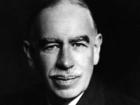
John Maynard Keynes, First Baron Keynes (June 5, 1883 - April 21, 1946) was a British economist, considered one of the most influential of the twentieth century. His ideas had a strong impact on economic theories and policies . The main novelty of his thought was to consider that the capitalist system does not tend to full employment or to the balance of productive factors, but to a balance that will only coincidentally coincide with full employment. Keynes and his postwar followers emphasized not only the upward nature of aggregate supply, as opposed to the classical view, but also the instability of aggregate demand from shocks in private markets as a result of the ups and downs in the investor confidence. The main conclusion of his analysis is a commitment to direct public intervention in the field of public expenditure, which makes it possible to fill the gap or deficit of aggregate demand.1 He is also considered as one of the founders of modern macroeconomics. Keynes was a very versatile character. In addition to being a theoretical economist who changed the view of macroeconomics in the twentieth century, he also held multiple positions in the economic world, was a professor at Cambridge University since 1908, editor of the Economic Journal since 1912, secretary of the Royal Economic Society , a senior official of the British Administration and international negotiator on behalf of England on different occasions. He also worked in the corporate sector, the investment direction of an insurance company and a financial adviser to King's College, the Bank of England and the British government itself. Inside the world of economics, he was a big fan of economic history and a biographer of great economists. Outside the economic world, during his studies at the University of Cambridge became interested in mathematics, statistics, philosophy, literature and only ultimately the economy. He was also director and principal shareholder of the Cambridge Arts Theater and patron of the Bloomsbury group, collector of modern painting and bibliophile of scientific literature.




